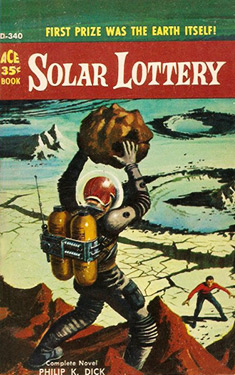
Added By: Administrator
Last Updated: FKatterjohn
Solar Lottery
Synopsis
Originally appeared in Ace Double D-103 (1955).
The operating principle was random selection: positions of public power were decided by a sophisticated lottery. Everyone had a chance, everyone could live in hope that they would be chosen to be the boss, the Quizmaster. But with the power came the game - the assassination game - which everyone could watch on TV. Would the new man be good enough to avoid his chosen killer? Which made for fascinating and exciting viewing, compelling enough to distract the public's attention while the Big Five industrial complexes run the world, the solar system and the people, unnoticed and completely unopposed. Then, in 2203, with the choice of a member of a maverick cult as Quizmaster, the system developed a little hitch...
Excerpt
ONE
There had been harbingers. Early in May of 2203, news-machines were excited by a flight of white crows over Sweden. A series of unexplained fires demolished half the Oiseau-Lyre Hill, a basic industrial pivot of the system. Small round stones fell near work-camp installations on Mars. At Batavia, the Directorate of the nine-planet Federation, a two-headed Jersey calf was born: a certain sign that something of incredible magnitude was brewing.
Everybody interpreted these signs according to his own formula; speculation on what the random forces of nature intended was a favorite pastime. Everybody guessed, consulted, and argued about the bottle--the socialized instrument of chance. Directorate fortunetellers were booked up weeks in advance.
But one man's harbinger is another man's event. The first reaction from Oiseau-Lyre Hill to its limited catastrophe was to create total catastrophe for fifty percent of its classified employees. Fealty oaths were dissolved, and a variety of trained research technicians were tossed out. Cut adrift, they became a further symptom of the nearing moment-of-importance for the system. Most of the severed technicians floundered, sank down, and were lost among the unclassified masses. But not all of them.
Ted Benteley yanked his dismissal notice from the board the moment he spotted it. As he walked down the hall to his office he quietly tore the notice to pieces and dropped the bits down a disposal slot. His reaction to dismissal was intense, overpowering, and immediate. It differed from the reaction of those around him in one significant respect: he was glad to have his oath severed. For thirteen years he had been trying every legal stratagem to break his fealty oath with Oiseau-Lyre.
Back in his office, he locked the door, snapped off his Inter-Plan Visual Industries screen, and did some rapid thinking. It took only an hour to develop his plan of action, and that plan was refreshingly simple.
At noon, Oiseau-Lyre's outworker department returned his power card, obligatory when an oath was severed from above. It was odd seeing the card again after so many years. He stood holding it awkwardly a moment, before he carefully put it away in his wallet. It represented his one chance out of six billion in the great lottery, his fragile possibility of being twitched by the random motion of the bottle to the number One class-position. Politically speaking, he was back thirty-three years; the p-card was coded at the moment of birth.
At 2:30, he dissolved his remaining fealty connections at Oiseau-Lyre; they were minor and mostly with himself as protector and somebody else as serf. By 4:00 he had collected his assets, liquidated them on an emergency basis (taking a high percentage loss on the fast exchange), and bought a first-class ticket on a public transport. Before nightfall he was on his way out of Europe, heading directly toward the Indonesian Empire and its capital.
In Batavia he rented a cheap room in a boardinghouse and unpacked his suitcase. The rest of his possessions were still back in France; if he was successful he could get them later, and if he wasn't they wouldn't matter. Curiously, his room overlooked the main Directorate building. Swarms of people like eager tropical flies crept in and out of its multiple entrances. All roads and all spacelanes led to Batavia.
His funds didn't amount to much; he could stall only so long and then action was obligatory. From the Public Information Library he picked up armloads of tape and a basic scanner. As the days passed he built up an armory of information relating to all phases of biochemistry, the subject on which his original classification had been won. As he scanned and crammed he kept one grim thought in mind: applications for positional-fealty oaths to the Quizmaster were processed only once; if he failed on the first try he was through.
That first try was going to be something. He was free of the Hill system, and he wasn't going back.
During the next five days he smoked endless cigarettes, paced an infinite number of times around his room, and finally got out the yellow section of the ipvic directory to look up the local bed girl agencies. His favorite agency had a nearby office; he made a grateful call, and within an hour most of his psychological problems were in the past. Between the slim blonde sent by the agency and the swank cocktail bar down the street, he was able to last another twenty-four hours. But that was as far as he could string it out. The time to act had come; it was now or never.
A cold chill lay over him as he got out of bed that morning. Quizmaster Verrick's hiring was integrated on the basic principle of Minimax: positional oaths were apparently passed out on a random basis. In six days Benteley hadn't been able to plot a pattern. It was impossible to infer what factor--if any--determined successful application. He perspired, took a quick shower, and perspired again. In spite of his days of cramming he had learned nothing. He was going in blind. He shaved, dressed, paid Lori her wages, and then sent her back to the agency.
Loneliness and fear hit him hard. He surrendered his room, stored his suitcase, and, for a better margin of safety, bought himself a second good luck charm. In a public washroom he buttoned the charm inside his shirt and dropped a dime in the phenolbarb dispenser. The sedative calmed him a trifle; he emerged and flagged down a robot taxi.
"Main Directorate building," he told the driver. "And take your time."
"All right, sir or madam," the MacMillan robot answered, adding, "Whatever you say." MacMillans weren't capable of fine discriminations.
Warm spring air billowed into the cab as it zipped above the rooftops. Benteley wasn't interested; his eyes were fixed on the growing syndrome of buildings ahead. The night before his written papers had been shot in. He had waited about the right time; they should be appearing on the desk of the first checker along the unlimited chain of Directorate officials.
"Here we are, sir or madam." The robot taxi settled down and grappled itself to a halt. Benteley paid it and stepped from the open door.
People hurried everywhere. The air buzzed with a constant murmur of excitement. The tension of the last few weeks had risen to fever pitch. Ramp hawkers were peddling "methods," low priced sure-fire theories guaranteed to predict bottle twitches and beat the whole Minimax game. The hawkers were ignored by the hurrying throngs of people; anybody with a genuine system of prediction would be using it, not selling it.
On a main pedestrian artery Benteley paused to light a cigarette. His hands weren't shaking, not really. He shoved his briefcase under his arm and put his hands in his pockets as he continued slowly toward the processing lounge. The heavy check-arch passed around him and he was inside. Perhaps by this time next month he would be under fealty to the Directorate . . . he gazed up hopefully at the arch and touched one of the charms inside his shirt.
"Ted," a voice came, small and urgent. "Wait."
He halted. Breasts bobbing, Lori threaded her way through the tight-packed crowd and came quickly up to him. "I have something for you," she said breathlessly. "I knew I'd catch you here."
"What is it?" Benteley demanded tautly. He was conscious that the Directorate's teep Corps was close by; he didn't particularly want his intimate thoughts in the hands of eighty bored telepaths.
"Here." Lori reached around his neck and clicked something in place. Passers-by grinned in sympathetic amusement; it was another good luck charm.
Benteley examined the charm. It looked like an expensive one. "You think it'll do me any good?" he asked her. Seeing Lori again wasn't part of his plans.
"I hope so." She touched his arm briefly. "Thanks for being so nice. You hustled me off before I could tell you." She lingered plaintively. "You think you have much of a chance? Gee, if you get taken on, you'll probably stay here in Batavia."
Irritated, Benteley answered, "You're being teeped while you stand here. Verrick has them planted all over the place."
"I don't mind," Lori said wistfully. "A bed girl has nothing to conceal."
Benteley wasn't amused. "I don't like it. I've never been teeped in my life." He shrugged. "But I guess if I'm going to lock on here, I'll have to get used to it."
He moved toward the central desk, his i.d. and power cards ready. The line moved rapidly. A few moments later the MacMillan official accepted them, devoured them, and then addressed him peevishly. "All right, Ted Benteley. You may go in now."
"Well," Lori said wanly, "I guess I'll be seeing you. If you get locked on here . . ."
Benteley stubbed out his cigarette and turned toward the entrance of the inner offices. "I'll look you up," he murmured, scarcely aware of the girl. He pushed past the rows of waiting people, swept his briefcase tight against him, and stepped quickly through the door. The door snapped instantly shut behind him.
He was inside: it had begun.
Copyright © 1956 by Philip K. Dick
Reviews
Images
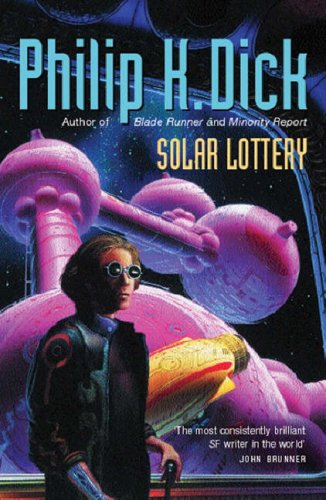
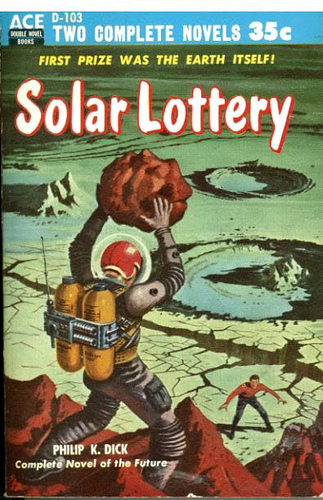
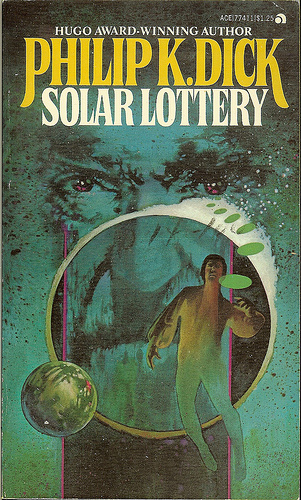
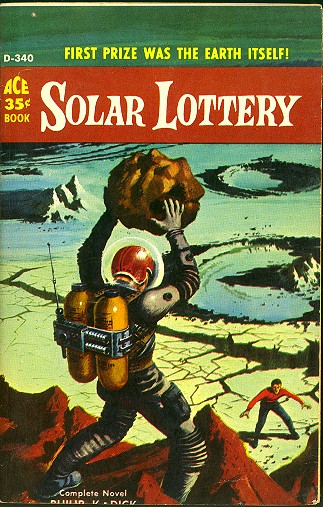
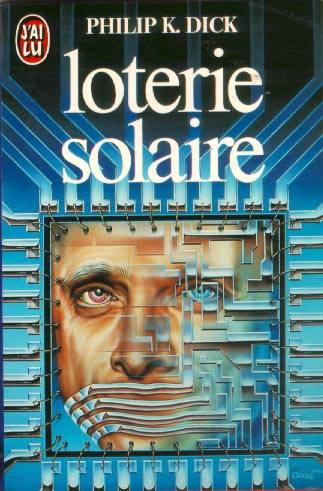
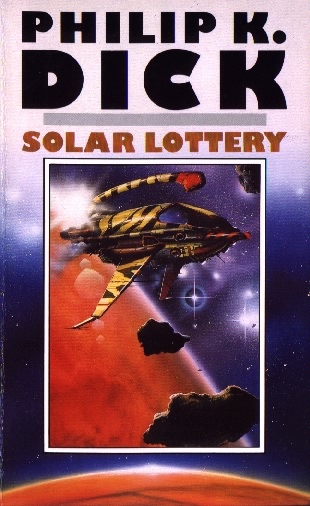
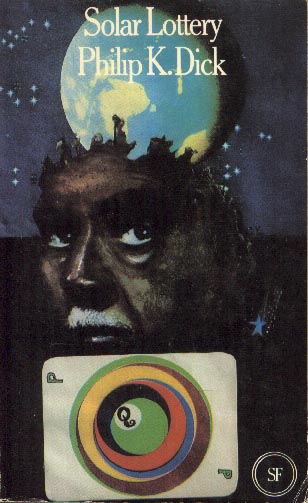
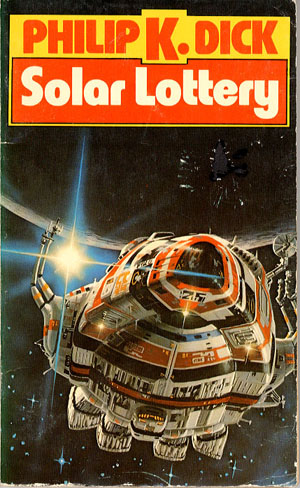
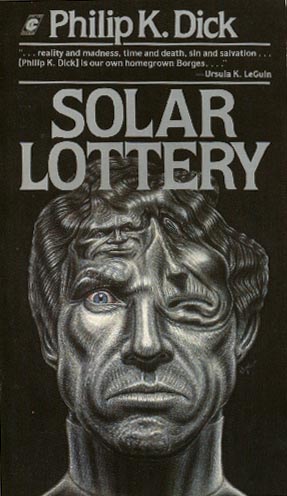
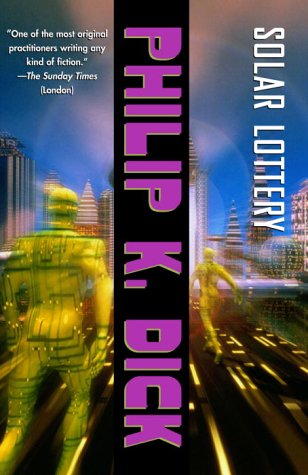




















 Full Details
Full Details





